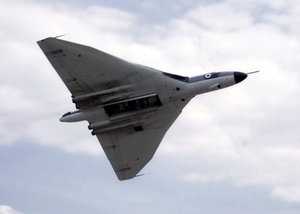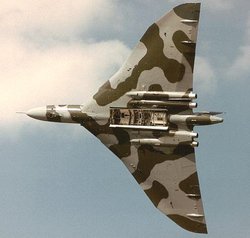Avro Vulcan
|
|
| Avro Vulcan B1 | |||
|---|---|---|---|
| Description | |||
| Role | Strategic nuclear bomber | ||
| Crew | 5 | ||
| First prototype flight | 30 August 1952 | ||
| First production flight | 4 February 1955 | ||
| Entered Service | 20 July 1956 | ||
| Manufacturer | A. V. Roe & Co., Woodford | ||
| Dimensions | |||
| Length | 97 ft 1 in | 29.6 m | |
| Wingspan | 99 ft | 30.2 m | |
| Height | 26 ft 6 in | 8.1 m | |
| Wing area | 3554 ft² | 330 m² | |
| Weights | |||
| Empty | 83,573 lb | 37,144 kg | |
| Loaded | lb | kg | |
| Maximum takeoff | 170,000 lb | 77,100 kg | |
| Capacity | |||
| Powerplant | |||
| Engines | Four Rolls-Royce Olympus turbojets | ||
| Power | hp | kW | |
| Thrust | lb | kN | |
| Performance | |||
| Maximum speed | Mach 0.95 at 12,000 m | ||
| Cruising speed | Mach 0.92 at 15,200 m | ||
| Combat range | miles | km | |
| Ferry range | miles | km | |
| Service ceiling | 55,000 ft | 16,750 m | |
| Rate of climb | ft/min | m/min | |
| Wing loading | lb/ft² | kg/m² | |
| Avionics | |||
| Avionics | |||
| Armament | |||
| Guns | |||
| Bombs | |||
| Missiles | |||
| Rockets | |||
| Other | |||
| Avro Vulcan B2 | |||
| Description | |||
| Missing image Vulcan.planview.640pix.jpg Avro Vulcan B.2 XH534 | |||
| Description | |||
| Role | Strategic nuclear & tactical low-level bomber | ||
| Crew | 5 | ||
| First prototype flight | 31 August 1957 | ||
| First production flight | 19 August 1958 | ||
| Entered Service | 1 July 1960 | ||
| Manufacturer | A. V. Roe & Co., Woodford | ||
| Dimensions | |||
| Length | 99 ft 11 in | 30.45 m | |
| Wingspan | 111 ft | 33.83 m | |
| Height | 27 ft 2 in | 8.28 m | |
| Wing area | 3965 ft² | 368.3 m² | |
| Weights | |||
| Empty | lb | kg | |
| Loaded | lb | kg | |
| Maximum takeoff | 204,000 lb | 92,543 kg | |
| Capacity | |||
| Powerplant | |||
| Engines | Four Olympus 201 (or 301) turbojets | ||
| Power | hp | kW | |
| Thrust | 4 x 17,000 lbf (76 kN), 201; 4 x 20,000 lb (89 kN), 301 | ||
| Performance | |||
| Maximum speed | mph | km/h | |
| Combat Range | miles | km | |
| Ferry range | miles | km | |
| Service ceiling | 55,000 ft | 16,750 m | |
| Rate of climb | ft/min | m/min | |
| Wing loading | lb/ft² | kg/m² | |
| Avionics | |||
| Avionics | |||
| Armament | |||
| Guns | |||
| Bombs | |||
| Missiles | |||
| Rockets | |||
| Other | |||
The Avro Vulcan was a British built jet engined, delta-winged subsonic bomber, once part of the RAF's V bomber force.
| Contents [hide] |
Design and prototypes
Design work began at A. V. Roe in 1947 under Roy Chadwick, the Ministry of Defence specification required a bomber with a top speed of 500 knots (930 km/h), an operating ceiling of 50,000 ft (15,000 m), a range of 3,000 nautical miles (5,500 km) and a bomb load of 10,000 lb (4,500 kg). It also held the distinction as the first fly-by-wire aircraft to enter service. Design work also began at Vickers and Handley Page, all three designs were approved - the Valiant, the Victor and the Vulcan.
Avro began scale prototype testing in 1948 with the single-seater Type 707, and despite the crash of the first prototype on September 30, 1949 work continued. The first full-scale prototype aircraft, the Type 698, was completed in August 1952 and made its maiden flight on August 31. The Vulcan name was not chosen until 1953.
Operational aircraft
In September 1956, the RAF received its first Vulcan B.1, XA897, which immediately went on a fly-the-flag mission to New Zealand. On October 1, while approaching London Airport to complete the tour, XA897 crashed short of the runway in bad weather conditions. The second Vulcan was not delivered until 1957, and the delivery rate picked up from then. The B.2 variant was first tested in 1957 and entered service in 1960. It had a larger wing and better performance than the B1 and had a distinctive kink in its delta wing to reduce turbulence. In all, 134 Vulcans were produced (45 B.1 and 89 B.2), the last being delivered to the RAF in January 1965. The last operational Vulcan squadron was disbanded in March 1984.
Nuclear deterrent
As part of Britain's independent nuclear deterrent the Vulcan initially carried Britain's first nuclear weapon, the Blue Danube gravity bomb. The bomb load was gradually updated to Yellow Sun and then Red Beard and from 1962 26 Vulcan B.2A were armed with the Blue Steel missile. When Blue Steel was decommissioned and the replacement program for the Skybolt ALBM was cancelled the bombers reverted to gravity bomb loads, despite the lack of credible deterrent value in this delivery method.
Conventional role
Vulcans were converted to a conventional bombing role in 1966, carrying 21 x 1000 lb (454 kg) bombs. The only combat missions involving the Vulcan took place in the 1982 Falklands War with Argentina, when a number of Vulcans flew the 3,380 nautical miles (6,300 km) from Ascension Island to Port Stanley to bomb the occupied airfield there with conventional bombs as Operation Black Buck. By this date the number of Victors available for air-to-air refueling was extremely limited, so some Vulcan aircraft were adapted in just fifty days to fulfill that role during the conflict. Five Vulcans were chosen for the operation, their bomb bays were modified, the fuel systems replaced and the electronics updated. The first bombing mission was on April 30-May 1 and there were five further bombing missions. At the time these missions held the record for the World's longest distance raids.
Miscellaneous
- The Vulcan was the first jet powered bomber to use delta wings.
- The Vulcan was used as test-beds for the Concorde engine, the Rolls-Royce/Snecma Olympus and the Rolls-Royce Conway turbofan.
- A Vulcan was featured in the James Bond film Thunderball.
- There are 21 Vulcans still relatively intact at air museums around the world.
Vulcan B1 specification
Missing image
Vulcan.xh558.sideelev.750pix.jpg
Avro Vulcan B.2 (XH558) in side view
- Speed: Mach 0.92 (cruise)
- Ceiling:
- Range 2,607 nautical miles (4,800 km)
- Power: 4 Bristol Siddeley Olympus 101 turbojets at 195,700 N each
- Crew: 5 Pilot, Co-Pilot, Navigator Plotter, Navigator Radar and Air Electronics Officer
- On 14 October,1975 Vulcan B. 2, XM645 of No.9 Squadron RAF Wadington lost its right undercarriage when it attempted to land at Luqa airport in Malta. The pilot decided on doing a circuit to crash land on runway 24 after it was covered with fire prevention foam. As the aircraft was turning inbound for the landing, it exploded in mid-air over Zabbar village, killing 5 of its 7-crew members. Large pieces of the aircraft fell on this populated village but with very low casualties - one woman who was shopping in a street was hit by an electric cables and was killed instantly and some 20 others were injured slightly. The pilot and navigator escaped death by using their ejector seats (which were only provided for the pilot and navigator in the Vulcan).
See also
External links
- Vulcan to the Sky (http://www.tvoc.co.uk)
- Vulcans in Camera (http://www.avrovulcan.org.uk)
- Vulcan on display at Castle Air Museum, California (http://www.elite.net/castle-air/vulcan.htm)
- Vulcan history (http://www.thunder-and-lightnings.co.uk/vulcan/history.html)
- Vulcan Restoration Trust (http://www.avrovulcan.com)
|
Lists of Aircraft | Aircraft manufacturers | Aircraft engines | Aircraft engine manufacturers Airports | Airlines | Air forces | Aircraft weapons | Missiles | Timeline of aviation |


